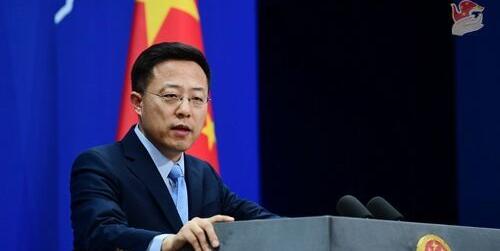
Chinese Foreign Ministry Spokesperson Zhao Lijian (Source: Chinese Ministry of Foreign Affairs official website)
US Secretary of State Blinken issued a statement on the 17th, listing Russia, China and 8 other countries as "special concerns about religious freedom." In this regard, the Chinese Foreign Ministry said that China firmly opposes the groundless accusations and smears of religious freedom in China by the United States. The Chinese government protects citizens' freedom of religious belief in accordance with law.
Beijing's Global Times reported that Chinese Foreign Ministry spokesman Zhao Lijian said at a regular press conference on the same day that There are nearly 200 million religious believers in China, more than 380,000 religious professionals, about 5,500 religious groups, and more than 140,000 religious activity sites registered according to law. The people of all ethnic groups in China enjoy full freedom of religious belief.
"Facts speak louder than words, and a lie repeated 1,000 times will not become the truth." Zhao Li insisted that the proliferation of extreme ideologies such as "Islamophobia" in the United States has caused a large number of tragedies. The US side does not reflect on itself, but also ignores the facts and frequently uses religious issues to interfere in the internal affairs of other countries. What the US side should do is to face up to its own domestic problems, do its own thing well, respect the facts, abandon prejudice, and stop using religious issues to interfere and smear other countries.
Zhao Lijian refuted the US agencies' China-related reports
The U.S.-China Economic and Security Assessment Committee submitted an annual report to Congress on the 17th, recommending the reliability of the US military's deterrent power and responding to the situation in the event of military action against Taiwan by the Chinese mainland. In this regard, Zhao Lijian responded on the 18th that the content of the report is full of false information and malicious slander, which essentially reflects the agency's long-term ignorance and prejudice against China.
At a foreign ministry news conference held on the same day, Zhao Lijian said that the committee concocted the so-called China-related report year after year, interfering in China's internal affairs and harming Sino-US relations. The relevant US institutions should abandon the Cold War zero-sum mentality and ideological bias, conform to the trend of the times and the expectations of the people of all countries in the world, plant more flowers and less thorns, and do more things conducive to Sino-US mutual trust and cooperation.
Zhao Lijian refuted the Taiwan-related remarks of high-ranking US officials
Newberg, the cyber security adviser of the US National Security Council and deputy assistant to the president for national security affairs, who is visiting Japan, said on the 17th that according to the current "Taiwan Relations Act" of the United States, the US government will provide support for Taiwan's defense, including network security. At the same time, she expressed concern that the cyber attacks carried out Chinese mainland and other means may damage cross-strait relations.
In this regard, Zhao Lijian said at a regular news conference on the 18th that on the Taiwan issue, what the US side should abide by is the one-China principle and the three Sino-US joint communiques, rather than what the US side unilaterally engaged in.
Zhao Lijian's so-called "Taiwan Relations Act" by the US side seriously violates the one-China principle and the stipulations of the three Sino-US joint communiques, and in essence, it overrides the US domestic law above international obligations, which is illegal and invalid. He said: What really harms cross-strait relations is the interference of "Taiwan independence" separatist forces and external forces.
Zhao Li insisted that the US side should stop shouting to catch thieves and stir up cross-strait confrontation, and earnestly abide by the one-China principle and the stipulations of the three Sino-US joint communiques, so as not to seriously damage Sino-US relations and peace and stability in the Taiwan Strait. (End)